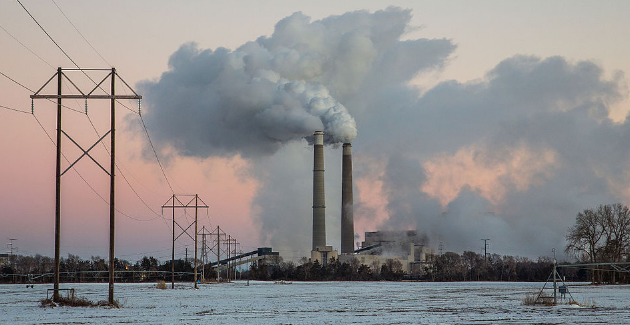Trump 100: Climate Change Retreat

In his first 100 days, US President Donald Trump has upended US climate policy. Unless he changes course, his administration may reverse hard-won international progress in the fight against climate change and Trump’s own voters will be among the losers.
The rise of nationalist populism in the West, vividly illustrated by Brexit and the election of Donald Trump, threatens to derail attempts at combating climate change. Despite some encouraging action globally, the Donald Trump presidency stands to unravel what progress has been made. Protectionism and resource nationalism intended to reverse the effects of globalisation and technological change will needlessly obfuscate and divert attention away from the climate crisis, eating up the most precious resource we have: time.
Mere moments after his inauguration on 20 January, Trump began to advance a revised national energy strategy centered on restarting America’s coal industry and the loosening of federal restrictions on the exploitation of fossil fuels. On 28 March he signed an executive order that scaled back Barack Obama’s historic Clean Power Plan, thereby ending the so-called “war on coal” which saw tighter emissions standards and the closure of many coal power plants. Obama’s policies were already delivering significant environmental dividends with carbon dioxide emissions 27 per cent lower last year than in 2005, putting the US on track for a 32 per cent drop in power sector emissions by 2030.
Ironically, the consequence of Trump’s actions will be to harm the very regions and voters he has vowed to protect, leaving the US as a laggard while the world embraces the largest technological transition since the first industrial revolution. The shift to a cleaner economy has already created thousands of construction and manufacturing jobs across the US. Employment in US solar companies grew 12 times faster than overall US job creation in 2015. Coal, both in the US and globally, is in decline as renewables begin to undercut it on price and companies reduce investments in new fossil fuel power plants for fear of being left with multi-billion dollar stranded assets in the years ahead. Last year saw a two-thirds drop in the construction of new coal power plants around the world. Trump’s vision of a coal-fuelled renaissance is delusional and damaging. It will leave American communities worse off than if they had embraced the historic energy transformation that is underway.
The executive order also damages action in areas where the federal government has legislative primacy and where it can provide significant leadership on the issue. Trump’s order removed rules forcing US government agencies to report on the climate ramifications of actions or projects and more significantly rolled back the powers of the Environmental Protection Agency (EPA) to enforce cleaner fuel and energy standards. Such moves inhibit decarbonisation efforts in non-electricity sectors such as enforcing emissions standards on vehicles and household appliances, updating building standards and reducing emissions from the agricultural sector, where deep cuts are inevitable but where there has been little progress to date. Obama’s policies weren’t a silver bullet, but they formed an important foundation for more aggressive action in the years ahead. Now much of that work will be lost.
The scientific consensus on climate change is that there is little time to delay. On the positive side, this past year has seen outstanding progress. Globally, the installed capacity of new renewable energy sources exceeded new fossil fuel power for the first time. Energetic entrepreneurs and new technologies such as battery storage are becoming mainstream and promise to revolutionise the energy sector: the cost of battery storage has fallen dramatically over the last 18 months and is expected to halve again by 2020. The 2016 Paris Agreement marked the first time the international community has faced climate change with such conviction. Though it will not solve the issue alone, the ratification of the agreement by the world’s two largest polluters, the US and China, and commitments by major emitters including the EU, Australia, Canada, India and Brazil, is the most encouraging step forward in climate negotiations to date.
Yet 2016 also saw major setbacks. It exceeded 2015 as the hottest year on record by a wide margin—seemingly now an annual event. For the first time, atmospheric concentrations of CO2 surpassed 400 parts per million, a threshold that has not been exceeded in three million years. It essentially locks in a 1.5°C temperature rise from pre-industrial levels. An increase of over 2°C will occur unless the global economy is significantly decarbonised in the coming decades. Sea levels have now risen 20 centimetres since 1901 and are projected to rise by more than one metre by the end of this century, displacing hundreds of millions of people. The latest projections predict that the Arctic will become ice-free in the summer by mid-century. Closer to home, the Great Barrier Reef experienced a bleaching event that scarred more than half of this natural wonder in a clear warning that the reef also might not see the middle of the century.
The global implications of Trump’s actions will be dire if he follows through on his election promise to withdraw from the Paris Agreement. Without US involvement, there is little chance of avoiding the 2°C global temperature rise. Backing out also sets a dangerous precedent and allows other countries to renege on their positions, further damaging hopes of averting catastrophic climate change. Again, though the Paris Agreement is no panacea, the Obama administration provided important leadership to get the deal across the line, particularly by working with China and India. By dialling down its involvement or removing itself entirely, the US will significantly jeopardise its global leadership on the issue.
Rapid decarbonisation has the potential to create millions of jobs in emerging economies as well as developed economies where mining and manufacturing have become obsolete. Trump’s vision to reinvigorate rusting regions and ‘make America great again’ seems at odds with his plan to dismember climate change policies that if properly employed would deliver signficant economic dividends for the US and the world.
Pivotal decisions will be made in the coming years. It is important not to lose momentum in the fight against climate change. Rather than clinging to the past, pursuing new technologies can help bring about a more sustainable and equitable world order.
Nicholas Peters is director of New Market Trading, an environmental commodity trader. He is also a clean energy and tech industry specialist and business consultant. He holds an honours degree in climate change politics from Deakin University.
This article is published under a Creative Commons Licence and may be republished with attribution.





